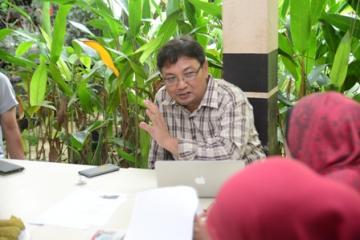Professor of IPB: Meat Self-Sufficiency Occurs in Next 20-30 Years Wednesday, March 26, 2015

Professor of the Faculty of Animal Science, Bogor Agricultural University (IPB), Prof.Dr.Muladno said the target of meat self-sufficiency in two or three years is political because according to him, it will not happen in such a short period when we look at the cattle breeding conditions in Indonesia at this time: the total existing cattle population is only 16 million, and it includes imported cows and female cows.
This is conveyed in a press conference in Bogor, on Thursday (19/3). According to the originator of the People’s School of Animal Husbandry (SPR) in 1111, most Indonesian cattle owners (6.5 million people) are graduates of primary and secondary schools. The current condition is that ownership of cattle per farmer is only 2-3 heads with various limitations such as lack of access, technological knowledge and use of traditional methods.
"Raising cattle is still a part-time business and is business wise. If you need money, you sell female cows. If you have money, you keep them. Breeders do not think of profit, but only think there should be money when needed (by selling the cow). For sure, they’re happy with and forced to be happy with raising cattle because it is the only thing that can be done, "he said.
To achieve self-sufficiency in meat, Prof. Muladno offers Partnership of Mulya 52, a partnership that can only be done in the system of SPR 1111. This gives bright hope that Indonesia would be self-sufficient in meat in the next 20-30 years.
"If someone says that self-sufficiency in meat can be achieved in two, three or five years, I think it’s not possible. It was just a political answer. The reason is the quality of our animals is very low and no system is completely set up to protect the existence of cows," he explained.
He explains, Partnership of Mulya 52 is an investment of 52 months to obtain 5 advantages and 2 nobleness. The advantages are a shared profit of 20-40 percent per year, monthly subsistence of farmers, prevented sale of female or productive, participation in increasing livestock population and doing business at the same giving charity. The two nobleness are educating and improving professionalism of small-scale farmers and empowering farmers to be independent and sovereign.
The Mulya 52 Partnership Scheme involves governments, financiers and breeders. The task of government is to provide parent cattle, vaccines, extension, and health checks of livestock. The task of financiers is to provide a monthly fund for farmers (600 IDR per month for 52 months) and the breeder’s task is to keep the parent cattle from the government. The scheme also involves the insurer to provide assurance for the farmers and investors.
"The agreement between investors and farmers will begin if it can be ensured that the parent cattle from the government are in pregnancy, and the young cow for sale is one that (born from the pregnant cow) is 1.5 years old. It is expected that within 52 months, for young cows can be born from one parent. Under the management of SPR, farmers and investors can both monitor ensure an accurate data of the cattle population. Further, cattle will be of better quality as it is monitored directly by the government and academician who are considered to have knowledge and technology, "he explained.
Then, what are the advantages obtained by the three parties (government, investors and farmers)? According to Prof. Muladno, through this scheme, the performance of the government to realize the success of meat self-sufficiency is measurable, in the right direction, and increase cattle population. For investors, with one scheme (two parent cattle) for 52 months, a total investment of IDR 30 million, the profit is IDR 6 million per year (equivalent to three times of the deposit interest rate). Farmers get the monthly funding of approximately IDR 400 thousand for themselves, IDR 200 thousand per month for their livestock (They no longer need to sell their animals for their daily needs), and a bonus (a shared profit of 1.5 times of each cattle sale). In total, farmers will benefit IDR nine million per year.
"Two parent cattle remain owned by the government. Farmers and investors can restart partnership when the contract of 52 month is over, "he said.
If the scheme is implemented nationally, the impact is a continuous growth of cattle population because there would be eight cows per 52 month. Breeders receive monthly loan to prevent livestock sales. Breeders and investors will feel secured as their livestock is insurance guaranteed if there is death of cattle or loss. The government programs would run well and successfully as the livestock is monitored by investors and colleges. Anyone (including individual ) can be an investor. No more productive cows are slaughtered, and slowly but definitely cattle self-sufficiency and meat self-sufficiency will come. (Mtd)


